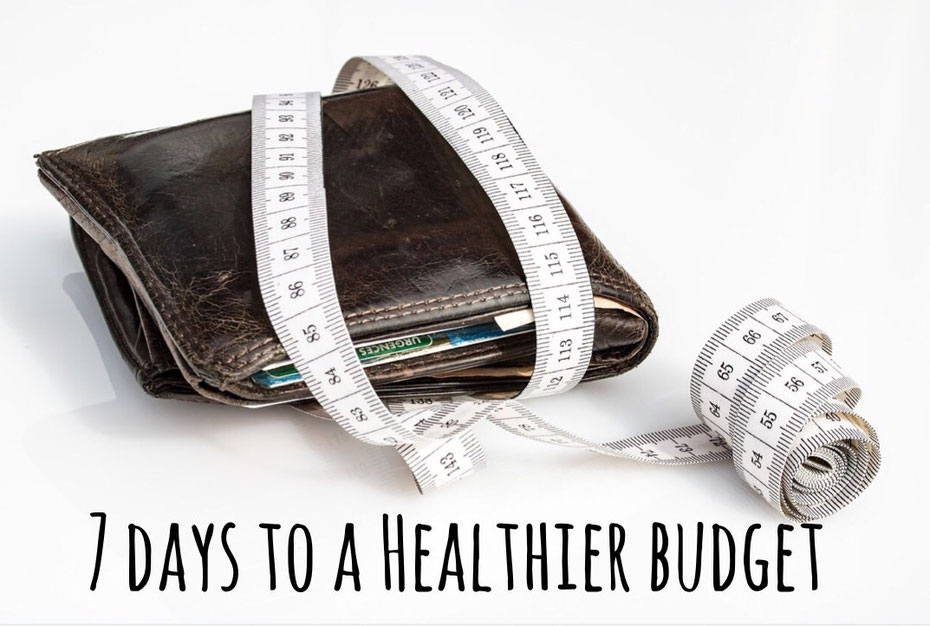Why is it always the opposite of what we have? If we want to lose weight we find it hard, yet we want to gain money and also find this hard? Ironic isn’t it?
I always liken finances to health and diet:
Debt is like losing weight, you just want to lose it and keep it off.
Savings is similar to improving your health, getting health behind you for a longer life.
A budget is like a diet, watching what you eat and limiting the quantities.
Get healthy, get wealthy – Well, at least get on the right track towards wealth by getting financially healthy.
I find that by writing down your goals and plans, it brings them to life and gives you something to work from. Writing down your financial situation can be the best way to give you a clear look at what you earn, spend, waste and save. It’s often a daunting process and something that we put off time after time as it all seems too hard and this stops us from getting anything sorted. Looking at your situation on paper often will keep you motivated to stay on top of it, and you won't even have to work up a sweat.
You don’t need to sort out your finances all in one day. Start with small steps to work towards getting your finances sorted instead. You will see things clearer and get a better perspective of your whole situation.
Instead of a massive overhaul, try thinking about finances in a different way: always strive to be in control of it and give yourself small challenges and tasks to do in order to stay in control. Experiment with your finances instead of setting yourself challenges if you feel that task is too hard. The word experiment has less pressure, you're more likely to stick to it and less likely to fail. No one likes that word so why put that pressure on yourself?
Experiment with a plan like this one, going through the list over 1 week, starting 1 new step each day to get your finances into shape. Don't be hard on yourself too. If you find it too hard, start again and refine it to your own needs and wants. Set small achievable goals. It's your experiment, all you have to do is make it work for you.
These steps are an easy list of challenges, goals, plan or experiment to start over 7 days. Call it what ever suits you to motivate yourself. I believe they are the first basic steps to lead you in the right direction and gain control of your money and your life.

DAY 1 - GET TO KNOW SOME BASIC SUMS
$20 each week = $1040 for 1 year. Work out all of the small amounts you spend each week. Add these up over 1 year to find out how much you waste and how much you could be saving or using for other good. Every time $20 a week is wasted, you’ve just thrown another $1040 away. Cut out as many small purchases to save thousands. What does $50 each week add up to? …and so on. Think of other ways to save small amounts to add up over each year. For further reading, check out 5 ways to save amounts you won't miss.
DAY 2 – PLAN TO SAVE AN EMERGENCY STASH
Start putting away any money you can until you have at least $1000 stash saved. This amount is handy to have in case of any unexpected emergencies; car trouble, appliance stops working. Keep this stash topped up if you happen to use it though. Replace any, if not more than you borrowed from it. This stash can save $100’s on credit card interest as you can pay small amounts instantly. For more reading on this, you'll find Rescue yourself with an emergency fund here.
DAY 3 - ADD UP ALL OF YOUR BILLS AND MAKE THEM LESS THAN YOU EARN
Write a list of all of the companies you pay money to: weekly, monthly and yearly. What is your yearly total? Did it shock you? Is this amount less than your annual income? Can you cut back on any of these immediately? Spend the day calling companies for any reductions on plans, memberships and services of any amount. Get creative in how you can live cheaper and think of alternate ways to achieve things. Just by reducing the cost of 4 things by $5 each week, you’ll save $1040 over the year. There’s that sum again. Read my yearly bills and expenses report for more info.
DAY 4 – CHANGE YOUR MONEY MINDSET
The best way to stop overspending and gain control of your finances is to change the way you think about it all. Having a money system and budget will be easier to follow. Think about why you want to buy material items to portray wealth to others. Are you living beyond your means by trying to keep up with unnecessary purchases. Minimise and clear out 1 room at a time but start today by organising unwanted items that you no longer need. If it doesn't bring you value or happiness, get it out of your life. Try to sell them and use all money towards debt or savings. Further reading here 'Change your money mindset'
DAY 5 – LOOK AT YOUR DEBT
List all of your debt from smallest to largest amount owed. Set up your payment plans and get rid of these one by one starting with the smallest. Pay all minimum repayments on each debt plus some extra on the smallest debt only. Once this one is paid off, use the amounts you used to pay the first debt off as extra for the next smallest debt to be paid off. Keep rolling amounts over to the next debt in line to pay all off with the extra repayments growing larger each time. 'Paying off credit cards' and 'Pay off debt using debt rollover' can be found here.
DAY 6 – EARN MORE MONEY
If your expenses are costing more than you’re earning, think about other ways to make some extra money. Can you minimise any clutter to have a clean out and sell any unwanted items? Or can you use your skills to provide a service in your spare time? Can your hobbies make you money? Think outside the square about earning money. I have a list of 25 realistic ways you can earn more money.
DAY 7 – GIVE ALL INCOME A JOB TO DO
If you have any income left over from expenses you’ve been able to tighten up, where can this amount be allocated for the best outcome? Can it be used to pay off more debt, put away for savings or put to better use such as an investment for the future? Just like all of your expenses, every dollar should be allocated, not just spent as you need it. This is a fast way to get into debt, have no life and for your finances to continue to control you. Plan and write down where all money is to go each pay. Read my other article 'Allocate all income' for further reading on this.
There's just 7 Easy tasks to work through and get started.
Aim to start 1 each day for a week. If this is too much for you, try and start 1 each week for 7 weeks.
The best thing you can do is just start. Start working towards a better budget and financial situation today, not someday.
If you can get these on track, you’re on your way to getting your money regime and in better shape. Although instead of an exercise regime, it’s a money regime for your wallet and bank account to put on weight.
...Doesn’t that sound better?


Write a comment